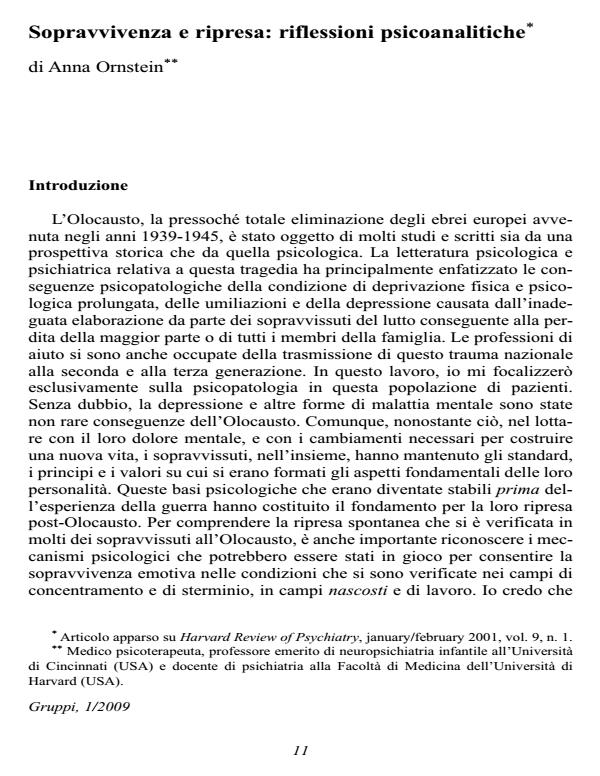Sopravvivenza e ripresa: riflessioni psicoanalitiche
Titolo Rivista GRUPPI
Autori/Curatori Anna Ornstein
Anno di pubblicazione 2009 Fascicolo 2009/1 Lingua Italiano
Numero pagine 20 P. 11-30 Dimensione file 126 KB
DOI 10.3280/GRU2009-001002
Il DOI è il codice a barre della proprietà intellettuale: per saperne di più
clicca qui
Qui sotto puoi vedere in anteprima la prima pagina di questo articolo.
Se questo articolo ti interessa, lo puoi acquistare (e scaricare in formato pdf) seguendo le facili indicazioni per acquistare il download credit. Acquista Download Credits per scaricare questo Articolo in formato PDF

FrancoAngeli è membro della Publishers International Linking Association, Inc (PILA)associazione indipendente e non profit per facilitare (attraverso i servizi tecnologici implementati da CrossRef.org) l’accesso degli studiosi ai contenuti digitali nelle pubblicazioni professionali e scientifiche
Survival and Recovery: Psychoanalytic Reflections - In response to a concern that the impact of the Holocaust will not be recognized by psychotherapists treating survivors, several psychoanalysts who were refugees from Nazi Germany devoted a great deal of time and effort to detailing the psychopathological consequences of the Holocaust trauma. Considering the magnitude of the trauma, it was not difficult to find evidence of psychopathology. However, because of their almost exclusive emphasis on psychopathology, most of these researchers failed to recognize the particular manner in which survivors mourned their enormous losses and made an effort to integrate their painful memories into the rest of their personality. This meant the loss of an opportunity to learn about the process of recovery following severe traumatization. The paper also described a hypothesis regarding the psychological mechanisms involved in adaptations to extreme conditions. From the author’s point of view, this constituted a link in the survivors’ effort to establish psychic continuity between their pre-Holocaust psychological organization and adaptations to a new life. Unlike her colleagues, the author believes that integration of traumatic memories was possible as long as the survivors encountered an empathic listening perspective and their effort to recover was validated. Survivors of trauma have every reason to expect that their stories will evoke fear, confusion, horror and disbelief and that therapists will protect themselves from these affects by resorting to generalizations or praise for the survivor’s heroism or special qualities. Such responses however make it impossible for survivors to proceed, and the affects associated with the traumatic memory may never, or only partially, enter the therapeutic dialogue. Once recovered and articulated, the memories are accompanied by grief and anger, indicating that an increase in self-cohesion, a healing of the vertical split, has allowed the previously feared affects to enter consciousness. From the author’s viewpoint, feeling anger is an expectable and healthy response in this context. Justified anger is not to be confused with chronic narcissistic rage, which can constitute the nucleus of severe personality disorders.
Key words: Holocaust, trauma, traumatic memories, adaptation, integration, empathic listening.
Parole chiave: Olocausto, trauma, ricordi traumatici, adattamento, integrazione, ascolto empatico.;
Anna Ornstein, Sopravvivenza e ripresa: riflessioni psicoanalitiche in "GRUPPI" 1/2009, pp 11-30, DOI: 10.3280/GRU2009-001002